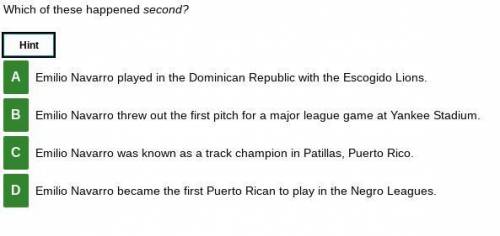No link need right answer
105 Years of Greatness
SAN JUAN, Puerto Rico. Emilio "Millit...

World Languages, 29.04.2021 23:00 smusisca53
No link need right answer
105 Years of Greatness
SAN JUAN, Puerto Rico. Emilio "Millito" Navarro never got to play in the major leagues. Still, he was considered to be one of baseball's greats. Navarro, who began his career playing for the Negro Leagues, died on April 30, 2011, in his Caribbean homeland of Puerto Rico. He was 105. In his old age, Navarro was believed to be the oldest living professional baseball player.
"It is a tremendous loss, but they were 105 years of greatness," said Eric Navarro Rivera, one of Navarro's grandsons, adding, "He gave his all to everybody."
Navarro was born on September 26, 1905, in Patillas, Puerto Rico. He became a baseball player at age 17. Before that, Navarro was known as a local champion in three track events.
Despite his athletic abilities, Navarro did not have the same opportunities as white baseball players. As a minority, he was not permitted to join the major leagues. Instead, he was given a chance to play in the Negro Leagues, which were founded in 1920 to provide a platform for African-American baseball players. Many baseball teams had hired black players during the 19th century, but by 1900 or so, racism brought about a change in policy. Baseball was racially segregated until 1947, when Jackie Robinson, who was African American, was recruited to the major leagues. Navarro, a 5-foot, 5-inch (165-centimeter) infielder known for his base-running skills, became the first Puerto Rican to play in the Negro Leagues.
Navarro was a shortstop and leadoff hitter for the New York-based Cuban Stars of the Eastern Colored League in 1928. He achieved a batting average of .337 the following year. Despite his accomplishments, Navarro recalled experiencing racial discrimination.
"Back then, there was a lot of racism...," Navarro said. "We [minority] players suffered a lot during that time because we even had to go to different restaurants [than white people]."
Navarro left the Negro Leagues after only a couple of years. He played in the Dominican Republic with the Escogido Lions and in Venezuela with the Magallanes and other teams. In Puerto Rico, he was the second baseman for the Ponce Lions for nearly two decades. After retiring from professional baseball, Navarro worked as a coach and an athletic teacher at schools in the Puerto Rican towns of Ponce and Caguas. He also raised a family.
"He was an... excellent father," said Eric Navarro Torres, one of his sons. "He instilled us with honesty and above all respect for everybody."
Navarro appeared on a major league ball field only once—in 2008, at the age of 103. He threw out a first pitch before a game at Yankee Stadium. He warmed up his arm, waved his hat, and made a 30-foot (9.1-meter) toss to catcher Jorge Posada. Asked how the sport had changed since he played, Navarro's eyes widened and he mentioned the high salaries that today's players enjoy.
"I made $25 a week," he said through a translator.
The Associated Press contributed to this story.
hint:
This question asks about when events happened. It does not ask where in the article the events appear. Look back at the article for clues, such as dates.


Answers: 1


Another question on World Languages

World Languages, 24.06.2019 06:00
This is chinese will mark brainliest what does hǎo bù hǎo mean? it is used to ask a question, good/not good? it is used when you are indecisive about something. it is used to say that something is both good and not good at the same time. it is incorrect and means nothing.
Answers: 2

World Languages, 25.06.2019 03:30
Is not a component of hearing. a. attempting to recall b. making an effort to attend c. providing feedback d. all of the above
Answers: 1

World Languages, 26.06.2019 16:00
Bailey enjoys working with her hands. she wants to choose a career path that would allow her to create things. which career would be best for her? a. zoologist b. greenhouse nursery worker c. energy auditor d. civil engineer e. jeweler and metal worker
Answers: 1

World Languages, 27.06.2019 02:30
Plagiarism—illegally using other people's ideas—can be avoided by a. adding a bibliography. b. proper documentation. c. taking good notes. d. using online sources only.
Answers: 2
You know the right answer?
Questions










Business, 19.11.2019 17:31


English, 19.11.2019 17:31


Computers and Technology, 19.11.2019 17:31





History, 19.11.2019 17:31



